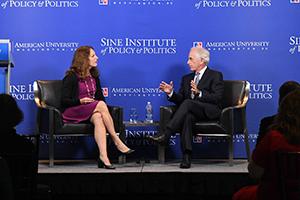Government & Politics
The Sine Institute Launches with Sen. Bob Corker Conversation

American University’s Sine Institute of Policy & Politics opened with a stimulating discussion between AU president Sylvia Burwell and Sen. Bob Corker (R-Tenn.). On Tuesday, September 25, Washington, DC, business, nonprofit, and government professionals, AU trustees, alumni, senior leadership, faculty, and students gathered in the Knight Conference Center at the Newseum. The themes of the day—and the mission of the new institute—were bipartisan solutions, unity, and confronting the nation’s pressing challenges.
The Sine Institute of Policy & Politics was made possible with a milestone $10 million gift from AU alumnus and trustee Jeff Sine, SIS/BA ’76, and Samira Sine, an accomplished journalist and advocate for women and children.
‘A Campus Where No One is Indifferent’
President Burwell bookended her opening remarks with quotes from two US presidents, Theodore Roosevelt and John F. Kennedy. “President Roosevelt once said that ‘the greatest reward that life has to offer is the chance to work hard at work worth doing,’” she recounted. “And the Sine Institute of Policy & Politics is all about the work that is worth doing.”
She later exalted Kennedy’s words at AU’s historic 1963 commencement. “A young President Kennedy observed on our Jacobs Field, ‘Our problems are manmade. Therefore, they can be solved by man.’ American University is a place for problem solvers; a community of changemakers; and a campus where no one is indifferent,” Burwell said.
“We are a university where all are welcome, provided they come with an open mind and a willingness to listen and learn—especially from those with whom we may disagree,” said Jeff Sine. “A commitment to dialogue and understanding that may not seem mainstream at this moment but is, in fact, an affirmation of the most important and enduring value that this university represents.”
Economic Strength, Fiscal Health
Burwell and Corker first worked together when Burwell was Office of Management and Budget director, and then later as Secretary of Health and Human Services under President Obama. In her first question, Burwell asked Corker about US fiscal health and economic productivity. While the economy has improved since the recession, he said, there’s a need to focus on the bottom 60 percent of workers in the country.
“Sometimes we only look at GDP growth at large, we look at where the markets are. But I think we probably haven’t done a good job looking through the entire socioeconomic spectrum and how everyone is doing,” he said.
Corker expressed disappointment over government spending and deficits. As a senator, he worked on issues surrounding the 2008 financial crisis, and he assumed Congress would subsequently move toward solving fiscal problems. “I was very optimistic about it. I’m now in a place where I feel like, unfortunately, it’s probably going to take a crisis for us to do that,” he explained.
He suggested Social Security reform should be on the table, and he implied that both parties could get on board.
“Things only happen like this under divided government, because no party wants to own changing Social Security or changing Medicare,” he said.
